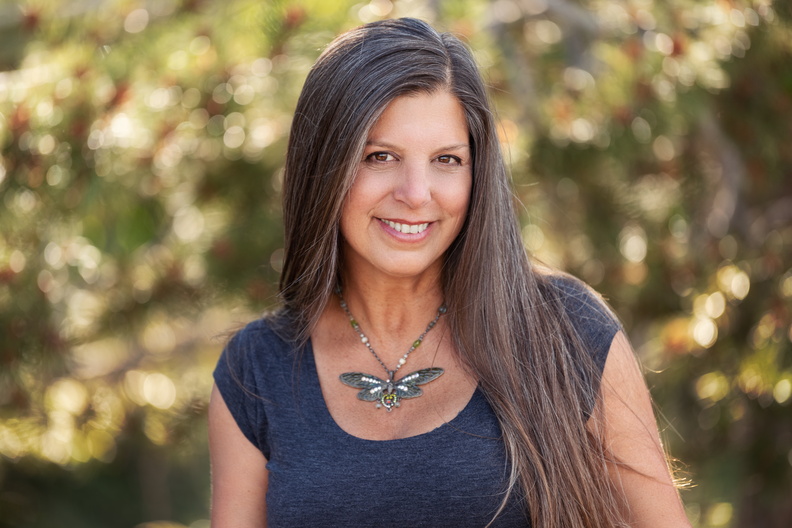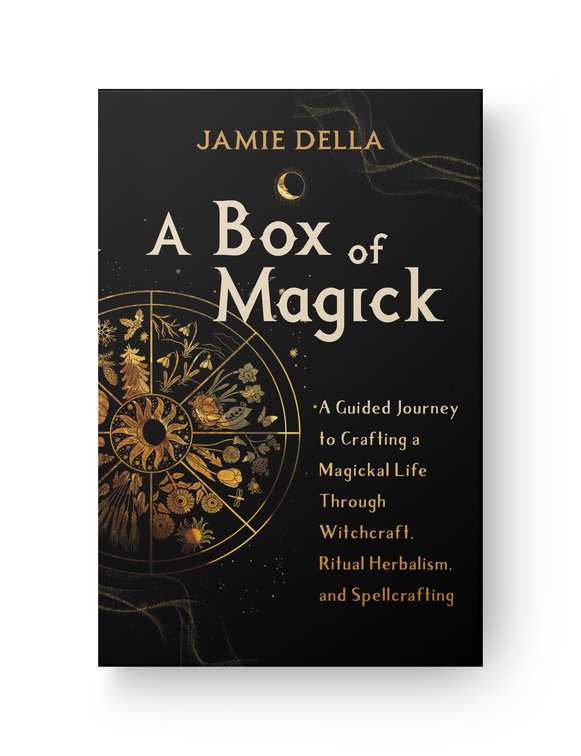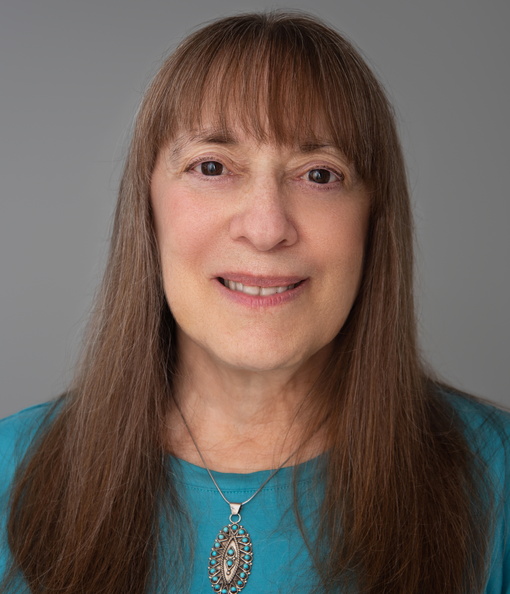You will attract Magick into your day when you see everything and every place as alive and in constant communication with you.
A Box of Magick: A Guided Journey to Crafting a Magickal Life through Witchcraft, Ritual Herbalism and Spellcrafting is a bold invitation to activate the deepest part of yourself with two magickal guides―myself, and my Elder Wiccan High Priestess and mentor Connie DeMasters.
At the onset of the 2020 pandemic, fifteen years after Connie’s passing, I received a literal box of Magick on my doorstep―23 pounds of my mentor’s rituals, hymns, spells, charts, astrology, and more. Help from beyond the veil materialized exactly when I needed strong arms around me and the Magick of hope.
At first, I was overwhelmed with this honor and the exclusive peek into my mentor’s instruction and teachings until I heard Connie say, “Tell them about us.” Afterall, Magick is crafted through the relationships and intentions we carry in our heart.
A Box of Magick inspires you to accept and honor our Divine Essence, develop abiding self-love, and stand with a sword of personal truth held ready. It demonstrates how an inspired mentor can help us make the connections between the messages, omens, and signs and our life choices and opportunities. Stories help us apply magickal insights to our own experiences and allow the lessons to settle deep into our bones. Rituals evoke the innate knowledge that Magick lives within us.

Thirteen illustrations depict setting up sacred space and altar, working with elementals, divination, archetypes, gods and goddesses, shadow work, universal influences, circle magick, spellcrafting and coming out of the broom closet—empowered and ready to live the Magick every day.
This book is a tribute to the power within us all and the Magick makers whose shoulders we stand upon. We are never alone on our Witchcraft journey. We can all learn the cosmic language of energy and vibration in nature and throughout the universe.

What Magick could you create if you joined the cosmic conversation?
Bright Blessings,
Jamie Della

Jamie Della is a priestess, healer, Xicana witch, and creativity mentor. She is the author of nine books, including most recently The Book of Spells: The Magick of Witchcraft, and is the author of the Herbal Journeys column in Witches & Pagans magazine. Learn more at jamiedella.com.

Learn More
Amazon | Barnes & Noble | Bookshop | Sounds True
We find ourselves in a time that is rich with paths toward spiritual awakening, especially that pinnacle of awakening called “nonduality.”
The Fullness of the Ground is my contribution to that abundance. It describes in detail the lived experience of nondual realization.
In the book, I offer a series of gentle attunement practices, called the Realization Process, for uncovering and knowing ourselves as a fundamental, undivided dimension of consciousness, pervading our whole body and environment. Pervading our body, fundamental consciousness is experienced as the authentic ground of our individual being. Pervading our body and environment, it is the basis of our oneness with everyone and everything around us. This means that we become whole as individuals at the same time as we transcend our individuality and experience unity with our surroundings.
As a longtime spiritual teacher and psychotherapist, I feel that there is not enough emphasis in some of the nonduality teachings about how this realization enriches our lives. I have been particularly concerned about teachings that encourage people to disconnect from themselves as individuals or to suppress their emotional responses to the world around them. In this book, I instead offer a path to nondual realization that is deeply embodied and that matures us as individuals, at the same time that it opens us to self–other oneness. Far from erasing us as individuals, nondual realization enhances our experience of our own unique existence. It deepens all of our human capacities, including our ability to feel, to think, and to enjoy our lives. It can help heal and enhance our relationships with other people by enabling us to experience deep contact with others without losing inward contact with ourselves.
Central to the method in this book is the important difference between being aware of the body and inhabiting the body. So I often begin with this simple exercise for experiencing this distinction:
Sit upright with your hands in your lap.
Take a moment to become aware of your hands. You may notice how warm or cold they are or how tense or relaxed they are. This is becoming aware of your hands.
Now enter into your hands. Experience yourself as present, living within your hands. This is inhabiting your hands.
You can go on to inhabiting different parts of your body and, finally, your body as a whole. See if you can feel present everywhere within your body, rather than aware of it from the outside.
In the Realization Process, we go through several steps, taking around 30 minutes, to reach this next part. But, for a very shortened version, if you can feel that you are living within your body, then next find the space outside of your body, the space in your environment.
Let yourself experience that the space inside and outside of your body is the same undivided space. Without leaving your body, experience that the space that pervades your body also pervades your whole environment. This is the spacious expanse of fundamental consciousness.
Judith Blackstone, PhD

Judith Blackstone, PhD, is a psychotherapist and innovative teacher in contemporary spirituality. She developed the Realization Process®, an embodied approach to personal and relational healing and nondual realization. She is the author of Trauma and the Unbound Body, Belonging Here, The Intimate Life, The Enlightenment Process, and The Empathic Ground.
A magazine article about Sounds True founder Tami Simon referred to her as a “spiritual entrepreneur.” At first, Tami wasn’t sure about the label. Yet over time, she came to appreciate and embrace it. Today, the art of spiritual entrepreneurship is a central facet of Sounds True’s Inner MBA® program.
In this host-only episode of Insights at the Edge, Tami shares her thoughts and feelings about what it means to lead a company dedicated to the well-being of its employees as equally as it is to business success. For anyone looking to bridge their innermost values with how they make a living, Tami reveals seven principles of the spiritual entrepreneur, with insightful guidance on honoring the voice of the heart; leading with presence; why relationships need to come first; creating a culture of care, engagement, and well-being; alternating between high performance and good rest; how to embrace challenges as growth opportunities; claiming our personal agency and doing the work of “cleaning up”; business as a means to address real social needs; maintaining trust in the unfolding process; making a commitment to “lift each other up” in the way we do business; recognizing our interdependence; and more.
What is spiritual minimalism? How do we “declutter” ourselves so we can hear and take action on the voice of our hearts? In this podcast, Tami Simon speaks with meditation teacher and author Light Watkins about his new book, Travel Light, and his “inside-out” approach to pushing past your limits to find and fulfill your purpose.
Tune in for a lively conversation that offers encouragement, inspiration, and practical insight, as Tami and Light discuss meditation as a tool to create space and hear the calling of your heart; taking action on your “why”; curiosity and trust; the heart as our personal GPS; leaving our comfort zones to begin our Hero’s Journey; the universe as your personal trainer; the “scary yes” and recognizing the feeling tone of the heart; the subtle disguises of the ego; the practice of split-testing your inner voices; rewiring your personality for greater alignment with your values; authenticity and service to others; doing less to accomplish more (really!); creating adventure instead of drama; and more.
Note: This episode originally aired on Sounds True One, where these special episodes of Insights at the Edge are available to watch live on video and with exclusive access to Q&As with our guests. Learn more at join.soundstrue.com.
We come into this world with a basic trust in the goodness of life. And our trials, tribulations, and traumas cover up that trust, or shatter it completely. In this discussion of his new book, Nondual Love, Tami Simon speaks with author and teacher A.H. Almaas about spiritual self-inquiry and the path toward reclaiming our sense of the boundless benevolence of the universe.
Take a deep, relaxing breath in a quiet, comfortable place and dive in to this inspiring, expansive conversation exploring: the Diamond Approach to spiritual realization; inner work as the quest to understand the content of consciousness; how truth is a continuum; the nature of experience and knowing; satchitananda; the Buddhist concept of selflessness; universal love and Sufism’s “ocean with no shores”; permanent realization; the ego and the inner Jabba the Hutt; “living daylight” and the overcoming of fear; how full embodiment frees us from our “diamond issues”; relaxation as the first step in experiencing nondual reality; asking yourself, “what’s in the way?”; and more.
To learn more about the Diamond Approach, visit https://www.diamondapproach.org/
Note: This episode originally aired on Sounds True One, where these special episodes of Insights at the Edge are available to watch live on video and with exclusive access to Q&As with our guests. Learn more at join.soundstrue.com.
What is the meaning of life? Can we really understand the nature of time and space or the structure of the universe? Is reincarnation real? Get ready for an extremely edgy episode of Insights at the Edge! Listen in as Tami Simon speaks with educator and author Chris Bache about his book LSD and the Mind of the Universe and the vast implications of the period in which we’re living.
This fascinating and gripping podcast delves into the purification of awareness and surrendering the ego; embracing pain and suffering; the overlapping enterprises of spiritual awakening and cosmic exploration; our collective evolution and midwifing the future human; the accelerated and intense process of development unfolding in humanity; reincarnation and the phenomenon of “deep time”; the multiple modalities of existence in our universe; spiritual traditions with an “up and out” perspective; the birth of “the diamond soul”; potentiating our enormous and divine creative power; dharmakāya, the clear light of absolute reality; the continual work of integrating experiences of cosmic proportions; taking a gentler approach to personal and spiritual growth; and much more.
Note: This episode originally aired on Sounds True One, where these special episodes of Insights at the Edge are available to watch live on video and with exclusive access to Q&As with our guests. Learn more at join.soundstrue.com.
© 2024 Sounds True. All rights reserved.